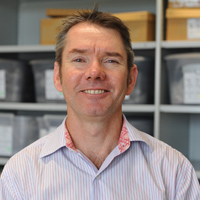Fast Facts
Location
Commencing
- Online: March, July, October
- Townsville: March, July, October
- Cairns: March, July, October
- Singapore: March, July, October
Students can commence in March, July and October of each year
Fees
Course fees are not applicable for Domestic students
Plus Student Services and Amenities fee
Fee deferral and scholarships available if eligible
Currently displaying fees for 2025, which are subject to change in following years.
Duration
4 years full-time
Entry Requirements
Course Code
View the handbook for course codes
Course detail
Designed for high performing university graduates, the Doctor of Philosophy (PhD) is a postgraduate research degree with a supervised project of original research at its core. Develop high level independent research skills while making an original contribution of knowledge to a specific discipline or area of practice.
As a JCU PhD candidate, you’ll have the opportunity to undertake focused research in the tropics. You’ll explore and generate new knowledge to meet the social, environmental and sustainability challenges facing tropical communities.
Create new knowledge, transform your future.
Work closely with experienced advisors to identify a research question, design and implement a project, analyse the results and document the research as a thesis. The PhD generally has no required coursework, although some can be taken as an option.
Manage your project challenges and timeline pressures with structured milestones built into the program. Benefit from professional development activities, participate in international conferences and publish your work along the way.
View the Handbook for a detailed overview of available subjects.
JCU Doctor of Philosophy graduates are internationally recognised as experts who discover valuable new knowledge in their fields.
The future for PhD graduates is diverse. The skills you develop during your PhD allow you to gain a toolkit for theoretical and practical approaches to problems and innovation with social and commercial impact. This will allow you to take on leadership roles across industry, government and academic sectors in a range of roles and contexts including researcher, practitioner, and research manager.
The table below can be used to view course information for each individual specialisation in the Doctor of Philosophy.
| Course Code | CRICOS Code | Course |
|---|---|---|
| 110502 | 081386F | Doctor of Philosophy (Agriculture, Environmental and Related Studies) |
| 110402 | 081387E | Doctor of Philosophy (Architecture and Building) |
| 111002 | 081381M | Doctor of Philosophy (Creative Arts) |
| 110702 | 081377G | Doctor of Philosophy (Education) |
| 110302 | 081388D | Doctor of Philosophy (Engineering and Related Technologies) |
| 110602 | 081922J | Doctor of Philosophy (Health) |
| 111902 | 106733D | Doctor of Philosophy (Indigenous) |
| 110202 | 081384G | Doctor of Philosophy (Information Technology) |
| 110802 | 081385G | Doctor of Philosophy (Management and Commerce) |
| 111602 | 081930J | Doctor of Philosophy (Medical, Molecular and Veterinary Sciences) |
| 110102 | 081389C | Doctor of Philosophy (Natural and Physical Sciences) |
| 110902 | 081379E | Doctor of Philosophy (Society and Culture) |
JCU, with the support of the Australian Government’s Research Training Program, will cover the costs of tuition fees for Australian citizens/permanent residents and New Zealand citizens.
All candidates can also apply for a competitively-awarded stipend to help with living and tuition costs.
A Student Services and Amenities fee is payable per subject up to a maximum amount per year.
Entry into a Doctor of Philosophy degree requires a Bachelor’s Degree with at least Honours 2A, a postgraduate qualification with a supervised research component of at least one semester full time equivalent or a Master of Philosophy.
To be eligible for entry, applicants must have attained at least one of the following:
a) a Bachelor’s degree with at least Second Class, Division A (Honours) in a degree program that included a total of at least a semester of supervised project work, the results of which contributed to the Honours grade;
b) a postgraduate qualification which included: (a) supervised research component(s) of at least one semester or equivalent and resulted in the production of output(s) graded at the equivalent of Distinction or better, and (b) at least one research methods subject;
c) a Research Masters degree, where at least two thirds of the degree consisted of a supervised research component and resulted in the production of a thesis or equivalent;
d) enrolment at this or another Australian university in a higher degree by research for the equivalent of at least 0.5 EFTSL with demonstrated satisfactory performance in the supervised research component(s);
e) a combination of qualifications, research training and experience, considered equivalent to the above by the Dean of the College to which the Candidate is applying, e.g., senior authorship of at least one peer-reviewed publication plus completion of an appropriate research methods subject.
Visit the Graduate Research School website for more information, and then complete an online application through our Online Application Portal.
Real stories
-

Student
Naomi Clark-Shen
Doctor of Philosophy
Enrolling in JCU for my PhD was an obvious choice – the university is world-renowned for shark research. My research focuses on the biology, ecology and life-history of small coastal sharks and rays in Southeast Asia. I can’t imagine a more appropriate university to advance my career in shark conservation with.
-

International Student - India
Rishab Pillai
Doctor of Philosophy
Undertaking a research degree can be a challenging, yet rewarding experience. At JCU, the incredibly receptive and friendly staff offer support to ensure you are research-ready from day one. With training and professional development as part of your PhD, you are job-ready upon completion of your degree.
-

International student - USA
Madeline McKenzie
Doctor of Philosophy. JCU alumni, 2018, Master of Science, majoring in Marine Biology and Ecology
As an international student from the US, I’m used to large lecture sizes, which limits the amount of time you get to interact with your professor. The smaller lecture sizes at JCU enables you to learn from leading scientists on a first-name basis, which really adds to the overall learning experience.
-

Lecturer
Professor Sean Ulm
Distinguished Professor Promotional Chair
As a PhD candidate at JCU you are a co-researcher in a world class team finding solutions that make the world a better place. You will be challenged to think outside the box, solve complex problems, and collaborate with amazing people from diverse backgrounds across multiple disciplines.